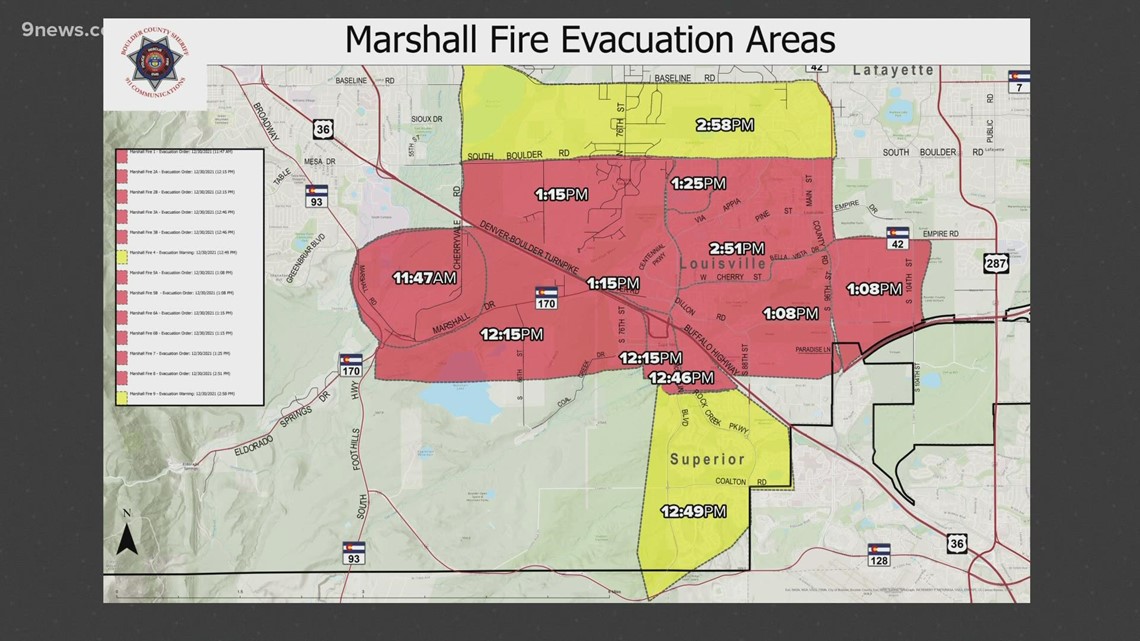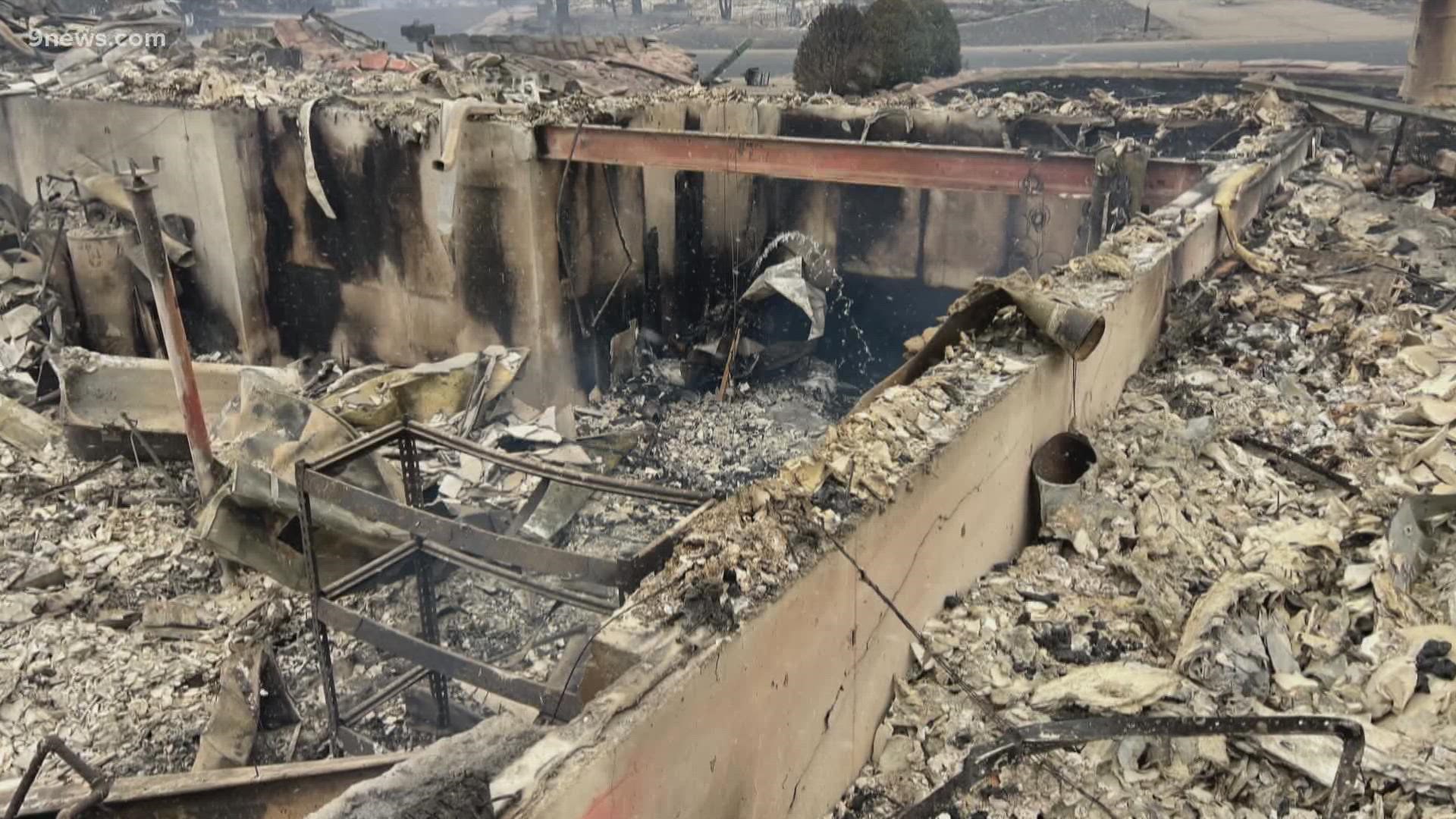DENVER — Reverse emergency notifications only work if you are signed up for them -- and if they are sent in a timely manner.
An area of Louisville that saw homes destroyed received a reverse notification to evacuate at 2:51 p.m. on the day of the Marshall Fire. Neighborhoods on each side of that area received evacuation orders much earlier: 1:08 p.m., 1:15 p.m. and 1:25 p.m.
"Is that acceptable? No. No," said Jody Ringle. "Why didn’t we get an alert? In plenty of time to the seriousness of it?"
Ringle and her husband lived just south of Harper Lake, east of McCaslin Boulevard in Louisville.
Their home was one of the 1,084 destroyed in the Marshall Fire.
"It’s just very sad. It’s like someone just bombed it," said Ringle.


She said that she never received an reverse notification to evacuate for two reasons. One, she was not enrolled in the opt-in reverse notification system for her cell phone or email. Two, she does not have a landline.
"I mean, we haven’t had a landline in, I don’t know? Fifteen, 18 years. I mean, it’s been a long time. I don’t know anyone who has a landline," said Ringle.
She had just returned home from a workout and said she noticed the clock in the car said it was 1:20 p.m. She remembers the time because she saw her neighbors, who had just returned home from vacation, packing their car, and she joked to herself that she had not done much by that time in the afternoon.
"When I was in the kitchen, I heard, kind of, like a speaker, like a megaphone, but I couldn’t make out anything," said Ringle. "It could’ve been a whole different outcome had I been in the shower or the restroom or down in the basement and never heard something that made me run to the front window."
When she went out front, she said she saw an officer had just talked with her neighbor. She flagged him down.
"And I said, 'What’s going on?' And he goes, 'You need to evacuate.' And I said, 'Now?' And he goes, 'Now.' OK. So, if you want to say that’s how I got notified," said Ringle.
RELATED: Boulder County was approved to use cell phone alert system in 2019, but never finished setting it up
"I got a text from my niece who lives in Wheat Ridge. Are you OK? Let me know if you need anything, if you need to come here. That was at 1:30 p.m.," said Beth Malone. "I thought, 'well that’s really weird, what’s going on?'"
Malone lives farther east in the same neighborhood that received the 2:51 p.m. reverse notification, but she found out about the fire from that family text and other texts from friends.
"No, that’s not how I’d like to find out about these things," said Malone.
Her home survived the Marshall Fire.
"I was already on the road when I got the notification," said Malone.
She was signed up for the reverse emergency notifications and received the 2:51 p.m. alert, but she had already evacuated.
"Why did this particular area get notified so much later than the areas surrounding me?" said Malone. "I would like to know that they are going to fix it before the next crisis arrives."
It has been 20 days since the Marshall Fire.
The Boulder County Sheriff's Office said that the city of Louisville would have to answer our questions about the 2:51 p.m., specifically if it was meant to go out earlier than it did. The city of Louisville on Tuesday said, "We are still looking into it."
"After the cop said you need to leave now, I went in each room. My brain just froze, I couldn’t think of anything to grab," said Malone.
RELATED: Boulder emergency alert system not as useful for families that don't primarily speak English
She initially left the house with just her coat. After sitting in traffic in her neighborhood for about 20 minutes, trying to get to South Boulder Road, she said she returned home after her daughter said she should go get her dad's laptop.
Ringle went back and grabbed two laptops and their passports.
"We have no wedding pictures. I would have grabbed wedding pictures. We have no family portraits. I have two wedding rings because I got a second one on our 25th anniversary. So, I don’t have my two wedding rings to give to my two daughters. My mom's wedding ring that I cherish, I would love it if they found that even more than my own," said Ringle. "I think in the back of my mind, I thought, 'oh, they’re going to let us back in in two or three hours."
As we have heard from others who lost their homes and others who evacuated in a hurry, they would like to see a system that does not require opting in.
"I get AMBER Alerts. I get AMBER Alerts all the time on my cell phone," said Ringle.
On Jan. 6, the Boulder County Office of Emergency Management provided an update on its emergency notification system. The update said that the Wireless Emergency Alert system (a text similar to an AMBER Alert) would use that system, along with the opt-in system during 2022.
>Do you live in Boulder County? Tell us about your experience getting notified to evacuate.
SUGGESTED VIDEOS: Full Episodes of Next with Kyle Clark

